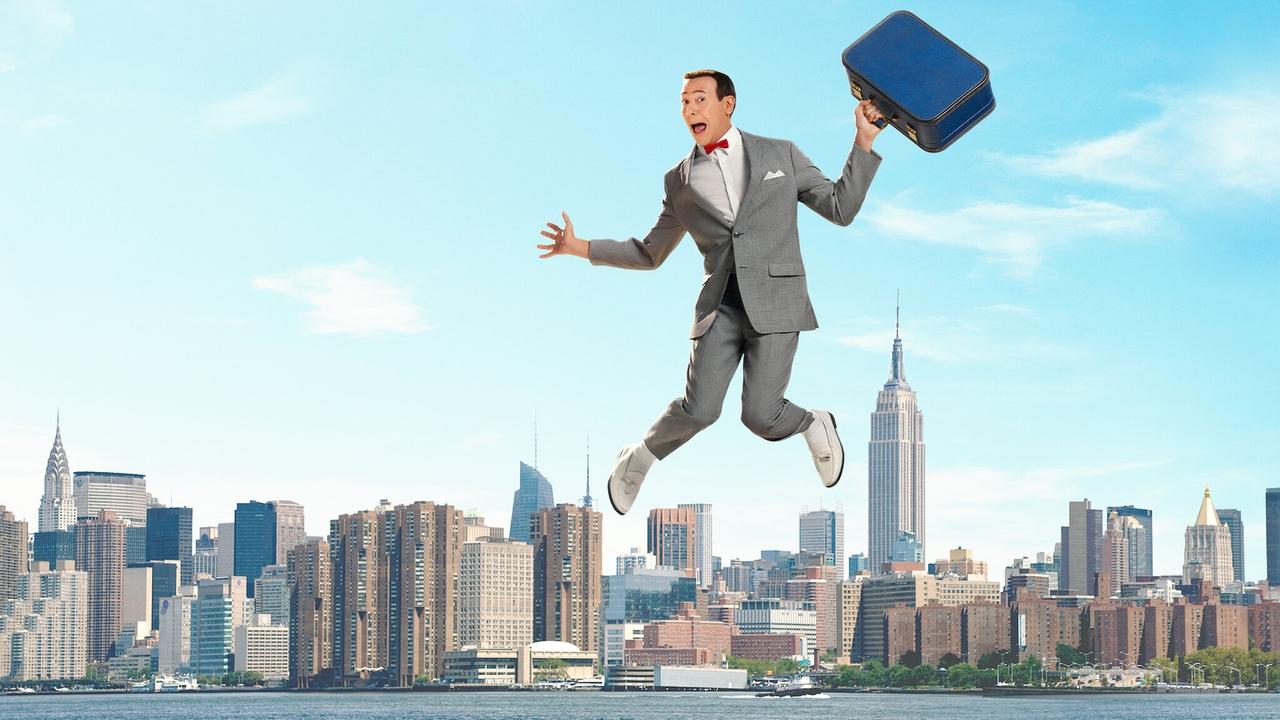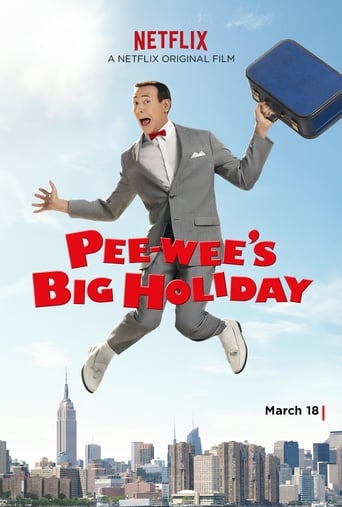Jeanskynebu
the audience applauded
Inadvands
Boring, over-political, tech fuzed mess
AutCuddly
Great movie! If you want to be entertained and have a few good laughs, see this movie. The music is also very good,
Darin
One of the film's great tricks is that, for a time, you think it will go down a rabbit hole of unrealistic glorification.
ilovemovies2016
Some of the worst green screen work i have seen to much green screen used through out the film almost screams laziness from the production team script needs a lot of work great for very young kids i understand this is meant to be stupid quirky and strange but at least put a small amount of effort here i understand there is a massive fan base for pee wee but for my this was just terrible (ps my first bad review on imdb)3/10
3 stars just for bringing back pee wee and having the town in the movie
tdrish
Pee Wees Big Holiday makes its way on Netflix, hopefully finding its way in your living room somewhere out there. The film is a pretty decent comeback from the 80's icon Paul Reubans. No, it doesn't hold a candle to Pee Wees Big Adventure, it lacks the magic and zany elements that Tim Burton provided. However, it's a helluva lot better then Big Top Pee Wee. I can't say that there were a lot of laugh out loud moments, but it's still worth a look, as I found it a ton of fun to watch. If it won't make you laugh, it's almost guaranteed to make you smile. It's a harmless, almost profanity free movie that the whole family can enjoy. My only complaint...I think they could have done without Pee Wee. And by Pee Wee, I am of course talking about the other Pee Wee in the movie, yes, there's another Pee Wee, no, not a twin, a female Pee Wee. Actually, I think they could have done without the three gang girls altogether, but putting Pee Wee in peril and danger is one of the things that will keep you watching. Hats off to the Netflix team with their job well done efforts, and hope to see more projects like this in the future.
graphicstyle7
I have been a Pee Wee fan ever since his Broadway show back in the '80's.Part of the reason I liked him? That would be his crazy, highly imaginative world that seemed to be, especially back in the day, so accepting of others eccentricities and differences.I enjoyed the first half of his most current movie. He hasn't changed a bit, and that's a good thing in many ways. His humor is classic. "If it ain't broke, don't fix it." That's why I was very surprised, hurt, and extremely put off when in the middle of this fluffy, happy comedy, one of the most mildewed, putrid tropes is dragged out of circa 1910 and aired out for no particular reason than to inspire actual cruelty and eat up time.Hey, all you fat chicks! Guess what? It's still totally OK to see you as a one note joke the hero is desperately trying to escape! You are OK with that, right? I mean, just because it's 2016 and there's a strong movement to see you as actual people with talents, dreams (Besides getting married) and personalities doesn't mean we can't depict you as a highly insulting stereotype, right? I'm guessing this was in the writers head as he wrote this tired, sad, and ugly part into the movie. It's 2016, guys. Big girls go out on real dates and have real lives and actually don't appreciate being depicted as a monster.Otherwise, it's an OK film. Next time, Mr. Rubens, leave the humor juvenile, but take out the mean spirit, OK?
schell-7
Pee Wee's Big Adventure had its share of charming, memorable scenes, frequently putting me inside of the child's mind. It was a movie going further than Orson Welles' own masterworks to demonstrate the great auteur's definition of film as "a ribbon of dreams." Pee Wee never strains to achieve a willing suspension of disbelief: he puts us in that state effortlessly and without apology, allowing us to see the movie-making process from conception through implementation through the final effect--which is not a semblance of reality or an imitation of life. Instead, the show is what it is: a movie less like the movies we remember than about the total belief we recall having in the films we loved as children--movies we trusted to renew our imaginary connections every Saturday afternoon.Any limitations in the previous Pee Wee films are forgiven with the arrival of "Pee Wee's Big Holiday." Even some 20 years after "Adventure," "Holiday" retains the weird, nerd-like, indeterminate child character of the earlier Pee Wee--all of the same wonder, fears, habits, obsessions. But there's a difference: this is a wiser, more educable, more sympathetic Pee Wee who has stepped out of the world of innocence to acquire enough adulthood to make us take his character more seriously, even measuring it against our own "growing." And that difference is due not so much to the persona of Pee Wee, who remains little changed, though how he's reflecting, albeit in the most subtle ways, the maturity and adult awareness of a changed Paul Reubens.The framework is classic: the hero's journey, or the Jungian archetype celebrated by Joseph Campbell and taught in virtually all screenplay classes. Not that Reubens is bound to each detail of the plan, but though Pee Wee remains largely "passive," his adventures produce, besides the Rube Goldberg opening and numerous gags and allusions to the movies (specific and general--for example, the early '30's movie starring Kate Hepburn as an aviator who breaks an altitude record ("Christopher Strong") as well as the B movies about glamorous women in prisons (here it's pillow fights that replace more harmful weapons).But there's a difference. Pee Wee has made a pledge to his friend Joe--a very real "manly man" who's having a birthday party to which he invites Pee Wee. As strong as the hero's 20-year endeavor in the original "Odyssey" of Homer, Pee Wee is determined to make it to the Big Apple {NYC} in time to attend the party. Along the way there are numerous "learning" or "teaching" moments which are impossible not to see as semi-autobiographical, an explanation on the part of Paul Reubens himself that simultaneously justifies the meaning of his life, the life of his character, and above all the life of the imagination.The end need not be specifically addressed (I know--no spoilers) except that, as in the original archetype, the darkest night precedes the dawn. Pee Wee's (and Reubens') redemption is at once an action of grace and of a certain amount of painful commitment on the protagonist's part. And as the archetype demands, the hero's circle is completed when he returns to his rural community of Fairview, not a sadder but a wiser person, having had a relationship that is lasting and real. In the process, Pee Wee's miniature world is exposed: it's the microcosm of the bigger world.Thus, Pee Wee teaches his friend Joe the value of miniaturizing a world as vast and overwhelming as NYC itself, by placing in perspective and gaining ownership of this vast space. And Pee Wee's friend, Joe, gives to Pee wee access to a greater world than that of his child's imagination. NYC is not Fairview's opposite but its projection--in terms of the narrative goal and its much bigger, real life scale. Each world is "indexed" to the other, and the negotiation between the two worlds is required for living life with a balance between artifice and reality, small and great, child and man.But it's Paul Reubens who has come of age--and without sacrificing any of the qualities that originally endeared us to his creation. Pee Wee is still a child-man, but he's grown: we can now gain our first glimpses of "the child that is father of the man." Living, growing, learning--like the movies, it all requires an understanding of "scale."

